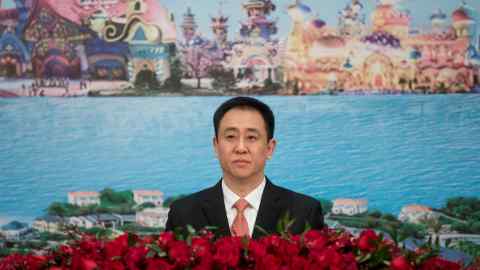Heart-warming, that the Evergrande executives are belated but still astute, and accept to their fate at the mercy of for-the-people-by-the-people
ft.com
Evergrande bosses face ‘severe punishment’ after securing early redemptions
Executives exited funds as Chinese developer delayed repayments to retail investors
7 hours ago

Evergrande is struggling to complete buildings for buyers who paid for their new flats in advance © AFP via Getty Images
Six senior Evergrande executives face “severe punishment” for securing early redemptions on investment products that the indebted Chinese property group subsequently told retail investors it could not repay on time, the company has said.
The admission comes ahead of a critical fortnight for the developer, which is struggling to repay investors, banks and bondholders, as well as complete flats for homebuyers who paid for their new properties in advance.
Hong Kong-listed shares in Evergrande fell as much as 18.9 per cent on Monday, while broader concerns about the health of China’s real estate sector triggered a wider sell-off.
Last week, hundreds of retail investors protested at Evergrande’s headquarters in the southern city of Shenzhen after executives said they needed more time to pay the interest and principal on high-yielding wealth management products issued by the group. They were joined by suppliers who said they had also not been paid.
Du Liang, a senior company executive, told investors that Evergrande had used at least Rmb40bn ($6.2bn) from wealth management sales to fund construction projects across the country, according to people who participated in settlement negotiations. In addition to the money Evergrande has borrowed from 80,000 retail investors, the group owes other creditors and suppliers an estimated $300bn.
In a statement at the weekend, Evergrande said that as of May 1 more than 40 group executives had purchased its investment products. Six of them, who had secured early redemptions of their investments, will return the money.
“All funds redeemed by the managers must be returned and severe penalties will be imposed,” said the company, which has also offered to repay investors with discounted flats and parking lots.
It is common for the owners and employees of heavily indebted Chinese companies to buy such products to help fund operations. Ding Yumei, wife of Evergrande founder and chair Hui Ka Yan, paid Rmb20m for group investment products in July.
Evergrande’s attempts to calm investor anger highlight the many challenges its debt crisis poses for the Chinese government, which is reluctant to bail out the company even though its collapse could have wide-ranging consequences.
Some Evergrande bonds have recently traded as low as 20 cents on the dollar, while yields on other Chinese property groups’ debt have risen sharply.
Recommended

Two Evergrande executives, who asked not to be identified, told the Financial Times that the group’s operations could be taken over by local governments and large state-owned developers on a “region-by-region basis”, but added that such a complicated rescue would be a “last resort”.
“Banks must extend our loans,” one of the executives said. “If they stop working with us, we will die right away. How is [the government] going to deal with so many unfinished [property] projects and handle so many retail investors?”
The value of Evergrande’s Hong Kong-traded shares has fallen almost 90 per cent over the past year.
The Chinese government recently organised a bailout of Huarong, a heavily indebted state-owned asset manager, by other government-controlled asset managers and banks. But it is reluctant to do the same for a large private-sector company such as Evergrande.
This year, HNA Group, an aviation and tourism conglomerate, applied to begin bankruptcy proceedings in its home province of Hainan. Although ostensibly a private-sector group, HNA was ultimately controlled by the Hainan provincial government, which was tasked by Beijing with overseeing its reorganisation.
Additional reporting by Hudson Lockett in Hong Kong |






